Liveable Incomes for All
December 14, 2020Auckland Action Against Poverty (AAAP) organised a protest outside PM Jacinda Ardern’s office in Mt Albert on Wednesday 9 December simultaneously with United Community Action Network (UCAN) in Wellington after more than 40 welfare and poverty charities signed an open letter to the Government pleading for them to increase welfare in the lead up to Christmas.
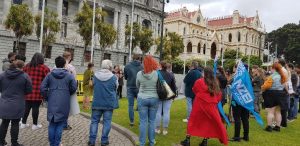 I joined the small, determined demonstration on the grass in front of Parliament. Speakers from UCAN, National Council of Woman, the TOP party, a supportive small business owner, student council representative, and a street poet to name a few, adding their voices to the chorus for the Government to address the glaring inequities in incomes for people of Aotearoa and respond to the research and recommendations already in front of them.
I joined the small, determined demonstration on the grass in front of Parliament. Speakers from UCAN, National Council of Woman, the TOP party, a supportive small business owner, student council representative, and a street poet to name a few, adding their voices to the chorus for the Government to address the glaring inequities in incomes for people of Aotearoa and respond to the research and recommendations already in front of them.
Ricardo Menéndez March former co-ordinator of AAAP now Green Party Social Development Spokesperson stated “we can use all of the legislative and ministerial levers to lift benefits immediately,” including a Members Bill on benefit levels.
 Following the protest we were invited to the Public Gallery to support Ricardo’s maiden speech. As we were taken to our seats ACT (Association of Consumers and Taxpayers) MP, Nicole McKee, was in the process of delivering her maiden speech, advocating passionately for licensed gun owners. Her comments jarred and felt insensitive being the very day the Royal Commission Report into the Christchurch Massacre was released. The afternoon ended with an invitation to Level 7 in Bowen House to join the Green Party function. The crowd at the function was young, passionate and deeply immersed in politics; Chloe Swarbrick as intimidating in real life as she is in Parliament despite her youth and diminutive stature!
Following the protest we were invited to the Public Gallery to support Ricardo’s maiden speech. As we were taken to our seats ACT (Association of Consumers and Taxpayers) MP, Nicole McKee, was in the process of delivering her maiden speech, advocating passionately for licensed gun owners. Her comments jarred and felt insensitive being the very day the Royal Commission Report into the Christchurch Massacre was released. The afternoon ended with an invitation to Level 7 in Bowen House to join the Green Party function. The crowd at the function was young, passionate and deeply immersed in politics; Chloe Swarbrick as intimidating in real life as she is in Parliament despite her youth and diminutive stature!
A hope-filled Advent experience in many ways with the words of the street poet lingering in my ears…
Adrienne Gallie rsj
Pope Francis declares a Year of St Joseph
Have you ever thought of St Joseph as a creatively courageous father?
That is how Pope Francis described Joseph as he announced a Year of St Joseph (8 December 2020 – 8 December 2021) in honour of the 150th anniversary of Saint Joseph being named as patron of the Universal Church.
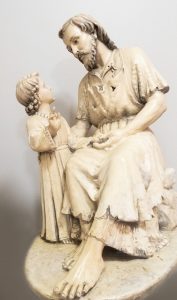 Having celebrated the 10th anniversary of Mary MacKillop’s canonisation with the theme of “Take fresh Courage” we are now invited by Pope Francis to reflect on and imitate the creative courage of St Joseph. Joseph was courageous in taking on the responsibility of becoming the husband of Mary and the legal father of Jesus and all that those two roles entailed. As we follow Joseph in the Gospel, we see how he could turn a difficulty into a possibility with his trust in the providence of God.
Having celebrated the 10th anniversary of Mary MacKillop’s canonisation with the theme of “Take fresh Courage” we are now invited by Pope Francis to reflect on and imitate the creative courage of St Joseph. Joseph was courageous in taking on the responsibility of becoming the husband of Mary and the legal father of Jesus and all that those two roles entailed. As we follow Joseph in the Gospel, we see how he could turn a difficulty into a possibility with his trust in the providence of God.
In his apostolic letter (8 December 2020), Pope Francis reflected on the qualities of Saint Joseph whom he described as a strong working man, a beloved, loving father, an accepting, obedient and “creatively courageous” person. The Pope wrote:
In the Gospels, St Joseph appears as a strong and courageous man, a working man, yet in his heart we see great tenderness, which is not the virtue of the weak but rather a sign of strength of spirit and a capacity for concern, for compassion, for genuine openness to others, for love.
In the eyes of the Pope, Saint Joseph is an extraordinary person who epitomises our own experiences. By reflecting on Joseph’s life, we can appreciate that God calls each of us to love freely, to accept our responsibility to welcome and serve others, to use and develop our gifts and talents, to appreciate the value and dignity of honest work, to overcome our challenges and become “courageously and firmly proactive” in our daily living. A “respectful and sensitive man,” Saint Joseph “did not look for shortcuts, but confronted reality with open eyes and accepted personal responsibility for it.”
Pope Francis encourages each one of us to imitate Joseph’s virtues and zeal as he urges us to:
Discover in Joseph — the man who goes unnoticed, a daily, discreet and hidden presence — an intercessor, a support and a guide.
Pope Francis concluded his letter with this prayer:
Hail, Guardian of the Redeemer,
Spouse of the Blessed Virgin Mary.
To you God entrusted his only Son;
in you Mary placed her trust;
with you Christ became man.
Blessed Joseph, to us too,
show yourself a father
and guide us in the path of life.
Obtain for us grace, mercy and courage,
and defend us from every evil.
Amen.
Sr Therese McGarry
The Meaning of Christmas
As we celebrate the Church’s New Year, we commence our journey towards Christmas confronted by the secular expressions of its significance as portrayed in our shopping centres, in the media and expressed in the decorations that don many houses in our neighbourhoods.
In his apostolic letter of December 2019 Pope Francis reflected on the meaning and importance of the nativity scene. He opened with the following statement:
A link to the letter has been provided below so that if you wish you can read it in its entirety.
Let us take Pope Francis’ words to heart and display the crib in our homes, offices, workplace, schools, hospitals, prisons or wherever we are ministering as a reminder that the message of Christmas is encapsulated in the nativity scene.
- The awe of parents with their newborn child,
- the first visitors to the stable – the shepherds with their humble backgrounds and ordinariness,
- the song of the Angels announcing a great event and
- the kings who travelling from the east to see for themselves the fulfillment of an old testament promise.
May the Christ-child be born again in our hearts and homes this Christmas.
Kath Hitchcock rsj
Pope Francis “Urbi Et Orbi” Christmas 2019 Message
Photo: Nativity outdoor decor during night time by NeONBRAND obtained from Unsplash.
Walking Together with Open Eyes
December 10, 2020United Nations (UN) Human Rights Day – 10 December
 When I was working in Kenya in 2004, I had the opportunity to visit a slum school and was greeted by 7-year-old Ashuru, who companionably took my hand and showed me around, introducing me to his friends and leading me into his classroom – a simple mudbrick room with a dirt floor, a few desks and hugely beaming smiles from front to back. The class sang enthusiastically, recited a poem, “I love my school”, and excitedly shared all they were learning. Later, we visited Kibera, the slum area where these children live. It is the biggest slum in Africa and one of the largest in the world. For me it was a privilege, a challenge and a never-to-be forgotten experience. It replicated the experiences I’d had in Peru in the 90s. The contrast between the generally well-resourced young people I’d taught in Australia and these smiling eager children with so little in material wealth couldn’t have been more stark. Yet I was struck again, as I’ve been so many times in my life, by the similarities of vision and passion of the human heart, especially of young people across the globe.
When I was working in Kenya in 2004, I had the opportunity to visit a slum school and was greeted by 7-year-old Ashuru, who companionably took my hand and showed me around, introducing me to his friends and leading me into his classroom – a simple mudbrick room with a dirt floor, a few desks and hugely beaming smiles from front to back. The class sang enthusiastically, recited a poem, “I love my school”, and excitedly shared all they were learning. Later, we visited Kibera, the slum area where these children live. It is the biggest slum in Africa and one of the largest in the world. For me it was a privilege, a challenge and a never-to-be forgotten experience. It replicated the experiences I’d had in Peru in the 90s. The contrast between the generally well-resourced young people I’d taught in Australia and these smiling eager children with so little in material wealth couldn’t have been more stark. Yet I was struck again, as I’ve been so many times in my life, by the similarities of vision and passion of the human heart, especially of young people across the globe.
And this year, as we celebrate the UN Human Rights Day on 10 December, we are reminded once again, both that such contradictions and similarities continue to exist right across our world, and that we still yearn for justice and equality for all.
It is this foundation and hope that is at the heart of the Human Rights Declaration that we celebrate on 10 December. Ratified in December 1948, The Universal Declaration of Human Rights, with its 30 articles, was signed by every country, and is recognised as binding on all. The articles are seen to be interrelated, interdependent and indivisible. At their best, they remind us of the freedoms and protections that belong to every one of us, stating clearly that “human rights are inherent to each person regardless of sex, colour, class or creed.”
Understandably then, the theme for this year’s Human Rights Day (Recover better – stand up for Human Rights) relates to the COVID-19 pandemic and focuses on the call to build such a world by ensuring that human rights are pivotal to recovery efforts across the planet. It was hope-filled and tremendously reassuring that, at the recent G20 summit, 19 of the 20 nations agreed to work together to ensure that future COVID-19 vaccines are a global public good with equitable access for everyone, everywhere. Indeed, a remarkable step forward for our world!
We in Australia have been blessed by our relative safety during COVID-19. As we support the UN efforts to create equal opportunities for all, we are also encouraged by the further call to tackle “entrenched, systematic and intergenerational inequalities, exclusion and discrimination.”
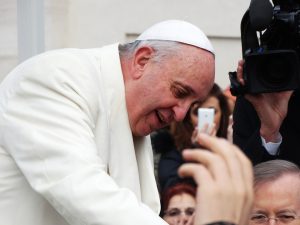 For us in Australia, these will involve questions and action for the Uluru Statement from the heart, the uninvited imposition of the cashless debit cards, the reality of increased imprisonment and deaths in custody, the increase in homelessness and the lack of affordable housing. They will demand advocacy for the Biloela family, the families on Nauru, the men suffering in Papua New Guinea, the people in community detention in Australia, those on temporary visas, as well as international students – all of whom have been excluded from Government assistance during the Coronavirus crisis. They will call us to continue our support for environmental action and care of earth.
For us in Australia, these will involve questions and action for the Uluru Statement from the heart, the uninvited imposition of the cashless debit cards, the reality of increased imprisonment and deaths in custody, the increase in homelessness and the lack of affordable housing. They will demand advocacy for the Biloela family, the families on Nauru, the men suffering in Papua New Guinea, the people in community detention in Australia, those on temporary visas, as well as international students – all of whom have been excluded from Government assistance during the Coronavirus crisis. They will call us to continue our support for environmental action and care of earth.
In this post truth era, Pope Francis challenges all of us:
Jan Barnett rsj
Josephite Justice Co-ordinator
Images:
Recover Better obtained from Human Rights Day – Resources | United Nations.
Pope Francis by reynaldodallin. Obtained from Pixabay.
Training Weekend for JAG Leaders
December 9, 2020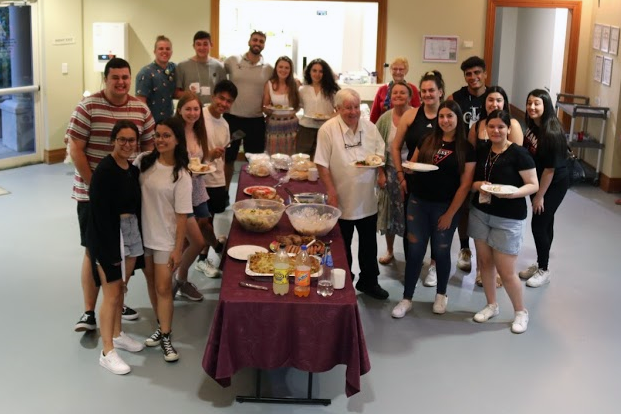
Josephite Action Group (JAG) Training Weekend – November 2020
Saturday (29 November) saw many veteran JAG volunteers and some new volunteers meet at St Joseph’s Spirituality Centre at Baulkham Hills to develop skills to host refugee families on a weekend away at Telford Recreational Centre at The Royal National Park in 2021.
We began with a ‘getting to know you’ session led by our volunteers Mikaela and Violet. Sr Maria then told us stories of her experiences with people who are refugees, thus bringing us to a better understanding of the reasons people flee their birth country and the obstacles they face trying to start a new life in Australia.
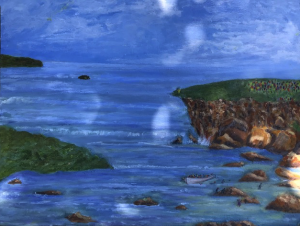
Time for personal exploration made use of Sr Helen Cooke’s painting, On the Edge. The volunteers were asked to reflect on where they stand on the issue of people seeking asylum. Are we indifferent, standing on the hill at the back of the group, preferring to remain ignorant? Are we in the boat with the people, wanting to develop a better understanding of their plight and to offer assistance and friendship? Or are we somewhere in-between? And indeed, wherever we are in this artwork, at this time, where would we like to be and why?
Each participant was given a copy of the image, and we were reminded that this was a good image to revisit often so that we could reflect on our understanding, empathy and commitment to a preferential option for the poor.
The remaining sessions focused on the program of events we were planning for our weekend away with refugee families. Ryley and Tom, another expert volunteer pair of leaders, worked collaboratively with the group to design the 2021 program. As we shared our excitement and anticipation, it was clear that the JAG volunteers were really looking forward to enacting this program and hosting the families.
During the past year, the JAGgers have partnered up with the House of Welcome (HoW) and this relationship continues to develop. It is our dream to invite families known to the HoW on our weekend away mid-year 2021. Our young volunteers continue to grow in their leadership capabilities. They are outstanding community of role models.
 We would like to extend a huge thank you to the Honourable Tony Burke MP for supporting our application for a grant for volunteer training. Also, a huge thank you to Christine and her team at Baulkham Hills for being our hospitable and supportive hosts this weekend. Finally we are most grateful for the Mary MacKillop Today Grant funding we will receive. This grant will support our partnership with the House of Welcome and our work with refugee families. It will also contribute to our weekend for new arrived asylum seeker and refugee families – a weekend hosted by our JAG volunteers.
We would like to extend a huge thank you to the Honourable Tony Burke MP for supporting our application for a grant for volunteer training. Also, a huge thank you to Christine and her team at Baulkham Hills for being our hospitable and supportive hosts this weekend. Finally we are most grateful for the Mary MacKillop Today Grant funding we will receive. This grant will support our partnership with the House of Welcome and our work with refugee families. It will also contribute to our weekend for new arrived asylum seeker and refugee families – a weekend hosted by our JAG volunteers.
Of course, most praise and gratitude should be bestowed on our JAG volunteers. Giving up the weekend to prepare for the refugee family excursion has been but one offering these incredible young people have enacted this year. The twenty young people who committed to the gathering galvanised us with their vision, their commitment to the Josephite charism, their leadership, and their wanting to get involved and make a difference.
We continue to be inspired by the JAG group and we are hopeful that these future leaders are provided with the opportunity to contribute, if not lead, a community centred in compassion and justice. JAG for PM I say!
Karen Oxley
Josephite Justice Network
Christmas Messages for 2020
December 8, 2020Regional Leaders and Sisters representing their regions, have provided Christmas messages for you to reflect on and enjoy…
The Story of the Pohutukawa Tree
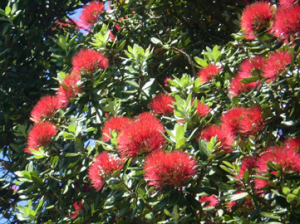
The pohutukawa tree (Metrosideros excelsa) with its crimson flower has become an established part of the New Zealand Christmas tradition. This iconic Kiwi Christmas tree, which often features on greeting cards and in poems and songs, has become an important symbol for New Zealanders at home and abroad.
In 1833 the missionary Henry Williams described holding service under a ‘wide spreading pohutukawa’. The first known published reference to the pohutukawa as a Christmas tree came in 1857 when ‘flowers of the scarlet Pohutukawa, or “Christmas tree”’ formed part of table decorations at a feast put on by Ngāpuhi leader Eruera Patuone. Several years later Austrian geologist Ferdinand von Hochstetter noted that settlers referred to it as such. The pohutukawa, he observed, ‘about Christmas … are full of charming … blossoms’; ‘the settler decorates his church and dwellings with its lovely branches’. Other 19th century references described the pohutukawa tree as the ‘Settlers Christmas tree’ and ‘Antipodean holly’…
Please continue reading below:
The Story of the Pohutukawa Tree (PDF)
Moya Campbell rsj
Regional Leader, Aotearoa New Zealand Region
[1] Image: ‘Pohutukawa tree’ obtained from https://nzhistory.govt.nz/media/photo/pohutukawa-flowers, (Ministry for Culture and Heritage), updated 14-Dec-2016.
The Meaning of Christmas
As we approach Advent and anticipate the feast of Christmas Day, many of us are concerned about how we will celebrate this special season with family and friends and with the wider community. Questions are being asked in all walks of life. How will midnight Mass be celebrated? How will the community experience Carol Singing? Will there be an extended family Christmas gathering? How will the Christmas Pageant be affected? How are relatives, friends and communities overseas coping with the Pandemic?
How will we celebrate Christmas this year while so many are grieving?
Father Richard Rolheier writes:
So, we rejoice this Christmas, aware of the ways we have been united by this pandemic and the strength of the sisters supporting and connecting each other wherever the need arose. There have been deaths, illnesses of loved relatives and friends, yet these were accompanied by an appreciation of each other, closeness and comfort in the knowledge that our love lives on and nothing can quell it. Let us continue to be flexible, to be open, to expect the unexpected, to look again into the horizon and to recall that joy is the meaning of Christmas.
This Christmas, may the blessings of the Christ Child bring us the strength he experienced when cradled in straw, the vulnerability and trust of a newborn and the resilience of his homeless parents.
Brigette Sipa rsj
Regional Leader, CentreWest Region
A Light in the Darkness
In our current global pandemic crisis, many people are riven with fear and anxiety. Suddenly life has become very fragile and we have come to realise that anything can happen to us from one minute to the next. Economics, policies, health care systems, religion, institutions of family and community life all have become abruptly insecure. In such circumstances, our normal certainties of life can quickly fade away leaving us doubting our ability to cope. Now, more than ever, we are being called to understand something of the true meaning of Christmas and the Incarnation story…
Please continue reading below:
A Light in the Darkness reflection (PDF)
Antoinette Dilworth rsj
Ireland Region
United in Spirit this Christmas
Three weeks before Christmas in 1899, taking advantage of a quiet day at Kincumber on the New South Wales Central Coast, Mary wrote her Christmas letter to the Sisters:
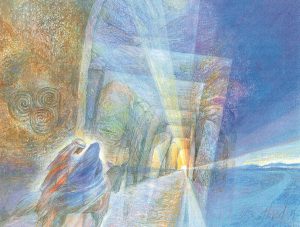
Mary greeted the Sisters, “Wherever this may find you, I with all my heart wish you a very happy Xmas and a bright happy New Year”.
On behalf of the Sisters and Affiliates of Queensland,
May this Christmas bring you joy, hope and new life, and may your coming year be bright, filled with blessings, grace and peace.
Lyn Stabler rsj
Regional Leader, Queensland Region
[1] Image: ‘Toward a New Dawn’ © M. Southard CSJ, www.marysouthardart.org. Used with permission.
Gifts and Presence
This is the time of the year when thinking about giving and receiving presents can loom large on our radar screens. Some search long and hard to find the most suitable gift for a friend or loved one. Others simply say “I have enough stuff. Don’t give me anything. I have all I need. Your presence is enough for me.” Some go to excess; others gift each other in simplicity, to show that their simple gift is a sincere gesture of love, of gratitude, of appreciation.
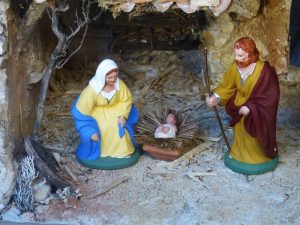 Yes, Christmas is really the celebration of profound simplicity. It is Jesus in a manger. What we are really celebrating is the awesome, wonder-filled presence of a baby. We marvel at the thought that this tiny baby will grow into the voice of God. It seems incomprehensible that this vulnerable baby is our God, enfleshed as a human being. Just like us. This baby is God’s present, God’s gift to each of us, beautifully wrapped in human flesh. It is cause for great celebrations!
Yes, Christmas is really the celebration of profound simplicity. It is Jesus in a manger. What we are really celebrating is the awesome, wonder-filled presence of a baby. We marvel at the thought that this tiny baby will grow into the voice of God. It seems incomprehensible that this vulnerable baby is our God, enfleshed as a human being. Just like us. This baby is God’s present, God’s gift to each of us, beautifully wrapped in human flesh. It is cause for great celebrations!
At Christmas we rejoice that Jesus, Emmanuel is God with us, God within us. This Presence is alive in us and is the central focus of Christmas gift giving. Having received that Present, that precious gift, we are invited in turn to recognise that Presence in all those we encounter this Christmas and in all the experiences we have as we celebrate. Jesus-Emmanuel is there in all our encounters – in the tense times, in the sad or lonely times which may be ours this Christmas, as well as in the fun and joy-filled times. This year, more than ever, our experiences of the pandemic have reminded us that the simplicity of the gift of our compassionate presence is the most precious of all.
The mutual exchange of gifts is our way of celebrating the mind-blowing, the “shocking”, fact that God became one of us, in Jesus, the Prince of Peace. So, let’s be presence to others. Let the gift of our presence be our sign that this wondrous Presence is real in our world and it can make a difference.
Mary MacKillop invites us to reflect on the quality of our gift to others:
Where are the Shepherds?
Local councils and shopping centres have begun ‘dressing up’ their community spaces for Christmas. What a lovely surprise to find the nativity scene displayed amidst the lights and colour of the commercial world. Some nativity scenes are small and insignificant, perhaps found in one shop window but how wonderful to find larger, well-placed displays in shopping centres. Mary, Joseph and the baby Jesus are there and often the three well-dressed Kings with their gifts tastefully presented.
But where are the shepherds?
I went checking the Christmas cards available and found that Mary, Joseph, baby Jesus, the Kings and a star are there in varying combinations but no shepherds.
We sing about shepherds in traditional Christmas Carols. When we coordinate children’s pageants, we have plenty of shepherds. We knew the shepherds well once, but it seems they are disappearing from public display and possibly from our consciousness.
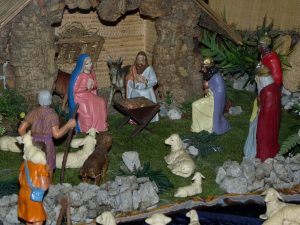
This year, the shepherds remind me of those many ordinary workers who have been working tirelessly day after day, caring and protecting those who come into their care. During COVID-19, we have been made aware of the many, many ordinary workers who are now heralded as the heroes:
The Aged care workers, the cleaners, the lowly paid hospital workers, the security people and nurses, have a new-found dignity in the public eye.
Those who have supported refugees, asylum seekers, prisoners, the homeless, those suffering domestic violence and those in quarantine.
Those seamen stranded on boats throughout the world keeping imports and exports flowing, not able to disembark anywhere.
Teachers, parents and grandparents who took on the task of education of children when schools were closed.
You know all these people and many more who are the ordinary, often low paid workers or volunteers who have been drawn to service and care as were the shepherds.
The Shepherds need to be in the nativity scene this Christmas, if not in our towns and cities, then in our minds and hearts. The good news of the Christmas story is that the Shepherds had the best view and ever since, have announced to the world that God loves the humble and lowly ordinary worker.
Anne Porter rsj
Regional Leader, New South Wales Region
[1] Photo: Religion-christmas-775015 obtained from PxHere. Used with permission.
Reflection on Mary MacKillop
The Queensland Sisters of Saint Joseph were honoured to have Bishop E. J. Cuskelly as chaplain.
Frank Fletcher MSC in one of his memorial lectures likens Cuskelly’s spirituality to the description by E.E. Cummings:
Bishop Cuskelly shared his spirituality with Mary MacKillop’s and fostered her saintliness in his preaching and in his writings.[1]
Mary MacKillop is the saint of reconciliation whom we all need. She excused and she forgave. Of a priest who had been the main cause of her excommunication and had told lies about her. She wrote:
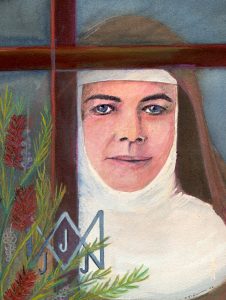
To some of the Sisters who had spoken untruths about her, she wrote: “I excuse and with all a mother’s heart I forgive. And I freely forgive and wish to forget, so I do entreat you my dearly loved ones, to forgive from your heart any sister that has pained you.” [2]
Cuskelly recounts a story from Mary’s teaching days at Portland where a school headmaster, Mr Cusack, came to the school. When the Inspector arrived to examine the classes, Mr Cusack poached the children from Mary’s and Annie’s classes and took credit for the well taught pupils while they were given the poorer students. By cheating, he prompted his class by giving answers behind the Inspector’s back. Mary’s father spoke loudly and strongly about these actions. Annie lost her job and Mary was blamed for what went wrong. All this took its toll on Mary. She was deeply hurt, was distrusted by some and it caused upset to the MacKillop family. Eventually Cusack lost his job and attributed blame to Mary. Again Mary was reconciliatory.
Mary Cresp’s sequel to this story demonstrates the depths of Mary’s forgiving heart and saintly life. When we read that Mary recognized an old acquaintance at Circular Quay, we are immediately engaged. However, when we discover that this dirty, alcoholic tramp was the schoolmaster whose cheating had led to Mary’s disgrace at Portland, the Gospel begins to unfold. For this man Mary sold her watch so that she could get him a suit of clothes and care. [3]
 Let us reflect:
Let us reflect:
- Mary MacKillop models a forgiving heart. Consider times you have been wrongly blamed, deeply embarrassed or hurt, or even lost friends or family because of a situation.
- What small gesture could heal a long time hurt?
- Often we suffer because of pride and an expectation on the ‘other’ to make the first move. In what small way can we emulate Mary?
Michele Shipperley rsj
Footnotes:
[1] Mary MacKillop – A Spiritual Model for All
[2] Ibid.
[3] Mary Cresp, Reflections on Beatification, 25 Jan 1995
Julian Tenison Woods: A Life – Chapters 24th to 26th
December 7, 2020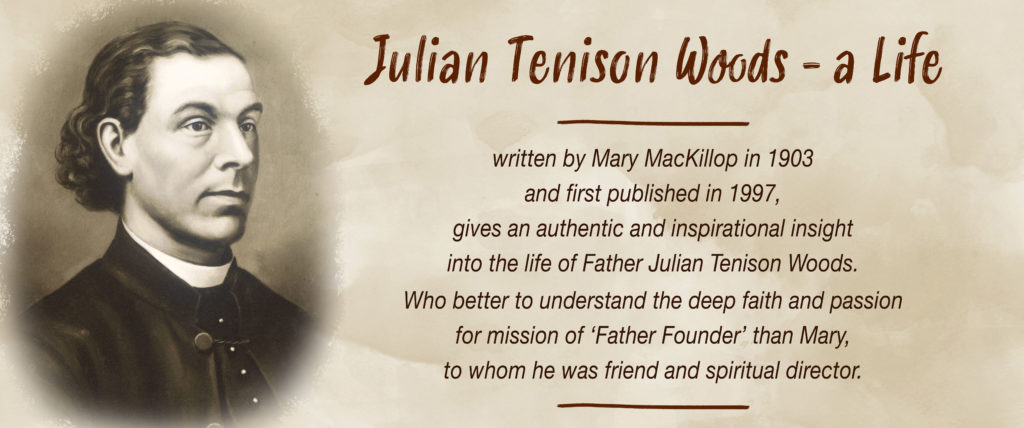
Chapters 24th, 25th & 26th
Father Woods wrote to Sister Mary:
Bathurst 19.8.71
Here I am arrived at Bathurst, after a very tiresome journey… The Bishop is most kind, too kind in fact, and has a fine lot of work for me to do…[i]
